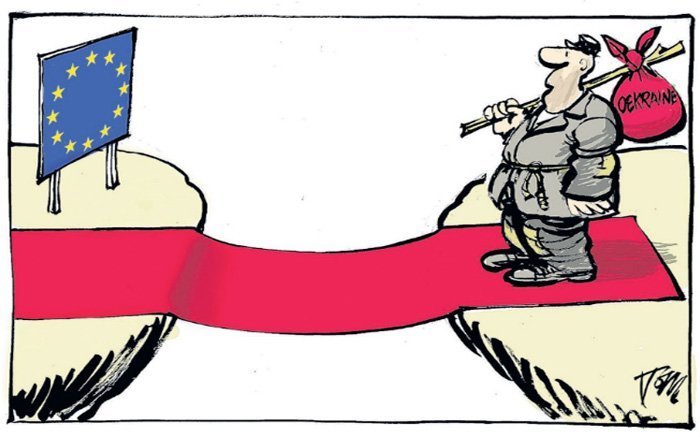
Tidsskriftet Foreign Policy er så tett innpå oligarkene og den politiske eliten du kan komme i USA. Det har skribenter som John Kerry, Madeleine Albright, David Petraeus og John McCain, bare for å nevne noen. Derfor er artikler der noe mer enn bare meningsytringer. De er ofte signaler for hva «djupstaten» i USA mener.
Det gjør at det er all grunn til å sette et nerke i boka når FP publiserer en artikkel som oppfordre Ukraina til å gi avkall på Donbass. Alexander J. Motyl som er professor i politisk vitenskap ved Rutgers University i Newark skriver:
Ukraine’s occupied Donbass region is a pointless burden. It’s time for Kiev to accept that it’s better off without it.
Og han argumenterer slik:
Indeed, the last two months have seen a major escalation by Russia and its proxies, leading some analysts to expect a full-blown war.
That being the case, it’s all the more unfortunate that Ukraine’s policy toward its occupied eastern Donbass region, which has been held by pro-Russian separatists since early 2014, is stuck in a dead end. Kiev lacks the power to defeat Russia and its Donbass proxies and cannot accept reintegrating the region on Vladimir Putin’s terms. But Kiev insists it must continue to fight for the region in the name of preserving national sovereignty and checking Putin’s aggression. Never mind that the Russian president’s willingness to invade, attack, or escalate appears to have little to do with what Ukraine does (or, indeed, with any rational strategy).
- First, Ukraine cannot roll back Russia militarily, and any attempt to do so would only increase its vulnerability.
- Second, possession of the occupied Donbass is an economic drain on whoever controls it.
- Third, reintegrating the occupied Donbass on Russia’s terms — with Russia controlling the national border and the Russian proxies who currently misrule the enclave still in place — would mean suicide for Ukraine.
På dette grunnlaget mener Motyl at Ukraina bør bite i seg fornedrelsen og la provinsen seile sin egen sjø. Dette kan være en prøveballong fra kretser i Washington, og sjøl om det er publisert i FP er det ikke sikkert at det er et enerådende syn. Men deling av Ukraina nevnes nå offentlig flere og flere steder. I Polen, der man er interessert i å kontrollere Vest-Ukraina, blir dette sagt åpent.
Nasjonalistene i Polen drømmer om å gjenreise Stor-Polen «mellom to hav» (Østersjøen og Svartehavet) så for dem vil det passe godt å dele Ukraina. For dem er den ukrainske byen Lviv fortsatt Lwów.
Og Polen har antakelig større gjennomslagskraft i Washington for tida enn det Ukraina her. Polens president Andrzej Duda sa i oktober 2015 til parlamentet i Warszawa:
I call on all citizens of the Republic of Poland to be ready to fight for the return of the former Polish lands, where our compatriots continue to be harassed and humiliated by the new Ukrainian leadership. If modern Ukraine condemns the acts of the Soviet Union – and it does, this state should voluntarily return the land of Poland, that belonged to it until 1939. We’re doing some work for the return of Polesie, Galicia and Volyn, and we need the support of the entire population of the Republic of Poland. Every citizen of the country must be prepared for the righteous struggle for the return of Polish territory and that is home to a huge number of ethnic Poles who need our protection.
Spillet om Ukraina er ikke slutt. For dem som ønsker et samlet Ukraina var antakelig statskuppet 22. februar 2014 noe av det verste som kunne skje.


 oss 100 kroner!
oss 100 kroner!